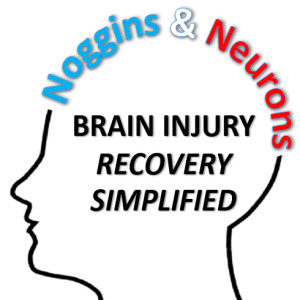
The NOGGINS AND NEURONS Podcast
Health & Fitness

Dr. Jones, TexMex, and Synaptic Connections
Noggins And Neurons Facebook Group
PETE: Hey everybody, this is Pete. I just wanted to jump in real quick and tell you about a mistake I made. I forgot to put the bio for our interview with Dr. Theresa Jones ahead of the actual interview. So, I’m gonna put the bio at the beginning of this episode, which kinda works because it is a review of the episode and what we learned, when we did interview Dr. Jones. Thanks!
DEB: New clinicians working in the world of stroke recovery need to understand what is too much too soon. And I think she made some good points about it. That early mobility doesn’t mean early intensity. So, you know, early mobility really is to get the person up so that other systems in the body don’t start to fail them. And...which would impact negatively, negatively impact their recovery. So we keep them healthy while they’re still in that acute stage so that when they enter that more subacute phase they can participate.
EPISODE SUMMARY: In this episode of NOGGINS & NEURONS: Brain Injury Recovery Simplified, Pete and Deb have a stimulating conversation about our interview with the Great, Dr. Theresa A. Jones, a behavioral neuroscientist from University of Texas at Austin. Some things we reflect on include:
- How repetition rules in learning. In fact, intensity and learned non-use came up again. It’s nice to hear Dr. Jones’ perspective and how to think and talk about these topics in practice and recovery.
- Getting beyond feelings of intimidation and putting people on different levels based on education and ego for improved communication and care.
- Real time look into the brain through windows in rat skulls.
- Being a woman in a male dominated field, making it work and resilience.
- Humility, communication and translating animal research to humans.
- Sorting through compensation and recovery and Dr. Jones’ research perspectives
- Moving into gray areas, thinking and clinical reasoning. Ask questions from the understanding that even science doesn’t have all the answers. Don’t be afraid to hear that you’re thinking is off track and be open to where it will take you in future thinking.
- Neuroplasticity in action and what it looks like in real time.
- Monkeys in research, COVID, travel and more questions to ask Dr. Jones.
We hope you enjoy our thoughts and find them mentally stimulating and thought provoking!
As always, we want to hear your top takeaways!
LINKS TO ARTICLES, BOOKS AND OTHER IMPORTANT INFORMATION:1
Repost of articles posted on the Dr. Jones interview:
Theresa A. Jones, PhD Articles:
Jones TA (2017) Motor compensation and its effects on neural reorganization after stroke. Nature Reviews Neuroscience. 18:267-280.
Clark TA, Sullender C, Jacob D, Zuo Y, Dunn AK & Jones TA (2019) Rehabilitative training interacts with ischemia instigated spine dynamics to promote a lasting population of new synapses in peri-infarct motor cortex. Journal of Neuroscience, 39: 8471-848
Dutcher AM, Truong KV, Miller DD, Allred RP, Nudi E & Jones TA (2021) Training in a cooperative bimanual skilled reaching task, the popcorn retrieval task, improves unimanual function after motor cortical infarcts in rats. Behavioural Brain Research, 396:
Dorothy A. Kozlowski, PhD and Theresa A. Jones, PhD Articles:
Use-Dependent Structural Events in Recovery of Function
Use Dependent Exaggeration of Neuronal Injury After Unilateral Sensorimotor Cortex Lesions
Use Dependent Exacerbation of Brain Damage Occurs During an Early Post-Lesion Vulnerable Period
Neural Plasticity and Neural Rehabilitation Following Traumatic Brain Injury
Combinatorial Motor Training Results in Functional Reorganization of Remaining Motor Cortex After Controlled Cortical Impact in Rats
Combining Multiple Types of Motor Rehabilitation Enhances Skilled Forelimb Use Following Experimental Traumatic Brain Injury in Rats
Learned Non-Use Article:
Barth, J., Geed, S., Mitchell, A., Lum, P. S., Edwards, D. F., & Dromerick, A. W. (2020). Characterizing upper extremity motor behavior in the first week after stroke. PloS one, 15(8), e0221668.
VECTORS trial
Questions and Comments about the podcast?
-
- NogginsAndNeurons@gmail.com
- NogginsAndNeurons: The Website
- Noggins And Neurons Facebook Group
Donate to The Noggins And Neurons Podcast with your PayPal app
Pete’s blog, book, Stronger After Stroke, and talks.
-
- Blog
- Book: Stronger After Stroke, 3rd edition
- Pete's talk for the American College of Rehabilitation Medicine.
Deb's OT Resources:
- Deb's OT resources
- The OT’s Guide to Mirror Therapy
- Tri-Fold Mirror (US address only)
- Occupational Therapy Intervention: Scavenger Hunt Visual Scanning for Adults
REQUEST TO BE A GUEST ON NOGGINS & NEURONS. If you’re passionate about stroke recovery and have information or a story you believe will help others, we’d love help you share it on the show. Complete the guest request form below and let’s see if we’re a good fit! Guest Request Form
Music by scottholmesmusic.com
More Episodes
 2024-10-23
2024-10-23
 2024-07-22
2024-07-22
 2024-06-27
2024-06-27
 2024-04-13
2024-04-13
 2024-03-27
2024-03-27
 2024-03-27
2024-03-27
 2023-07-09
2023-07-09
 2023-05-03
2023-05-03
 2023-04-05
2023-04-05
 2023-02-16
2023-02-16
 2022-10-11
2022-10-11
 2022-09-01
2022-09-01
 2022-08-23
2022-08-23
Create your
podcast in
minutes
- Full-featured podcast site
- Unlimited storage and bandwidth
- Comprehensive podcast stats
- Distribute to Apple Podcasts, Spotify, and more
- Make money with your podcast
It is Free
- Privacy Policy
- Cookie Policy
- Terms of Use
- Consent Preferences
- Copyright © 2015-2024 Podbean.com





